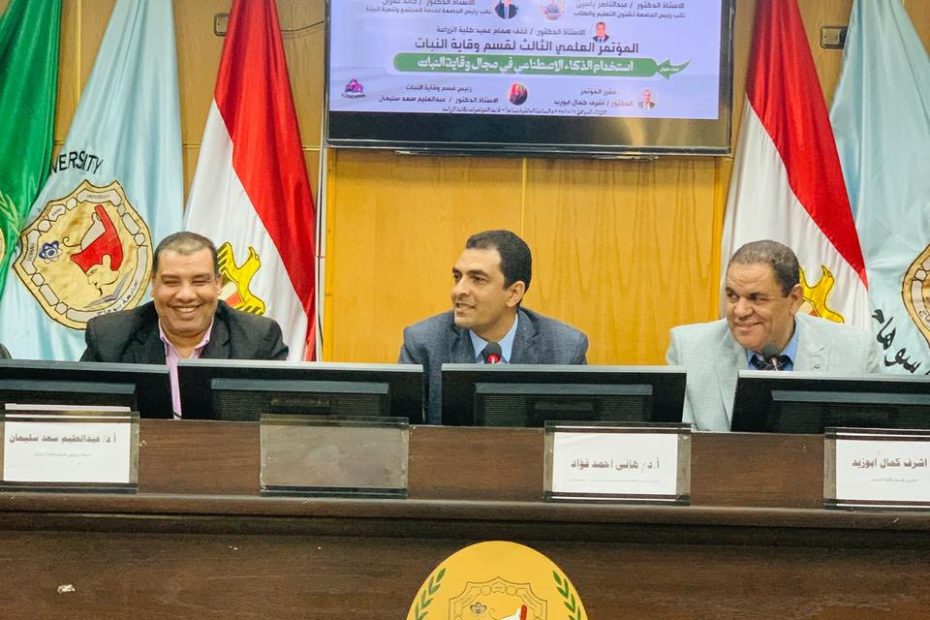The Faculty of Agriculture at Sohag University inaugurated the activities of the Third Scientific Conference of the Department of Plant Protection, held under the title “The Use of Artificial Intelligence in Plant Protection.” The event was attended by Dr. Hany Ahmed Fouad, Vice Dean for Education and Student Affairs; Dr. Abdel-Alim Saad, Head of the Department and Conference Chair; Dr. Ashraf Kamal, Conference Rapporteur; a group of faculty members and students; and research teams from the Plant Protection Research Institute at the Agricultural Research Center and the Desert Research Center.
Dr. Hassan Al-Numani, President of Sohag University, praised the conference’s theme, emphasizing its importance in exploring the role of AI applications in plant protection and in enhancing the capabilities of agricultural researchers to face environmental and agricultural challenges while promoting sustainability in agricultural production. He noted that Egypt gives great attention to integrating modern technologies into various sectors, especially agriculture, to keep pace with global advancements. He added that such scientific gatherings play a vital role in developing students’ skills, expanding their knowledge, and strengthening connections between research centers, students, and graduates to better prepare them for the labor market.
Dr. Khalaf Hammam, Dean of the Faculty, highlighted the faculty’s commitment to organizing conferences and scientific seminars that contribute to students’ academic and professional development. He explained that this year’s conference focused on the significance of AI and digital transformation in the agricultural sector, shifting from traditional to smart agriculture, which leads to better resource management, improved productivity, enhanced crop quality, and greater sustainability.
Dr. Hany Fouad stated that the Department of Plant Protection is dedicated to discussing the latest developments in the field and aims to enhance students’ competencies through knowledge transfer and collaboration with researchers and agricultural experts. This, he added, contributes to preparing a skilled generation capable of addressing agricultural challenges and improving the overall performance of the sector.
In his remarks, Dr. Abdel-Alim Saad described artificial intelligence as one of the most transformative technologies of the 21st century, with the potential to revolutionize multiple aspects of life. He noted Egypt’s proactive efforts in adopting modern technologies to boost agricultural productivity and efficiency. AI, he explained, supports farm management, pest control, reducing pesticide use, automation of agricultural machinery, and crop quality assessment, all of which enhance exports, improve farmers’ income, and promote sustainability. The conference recommended developing early-warning systems for plant diseases and pests using AI, as well as creating digital platforms and mobile applications to provide farmers with real-time information on best agricultural practices, soil, climate, and market prices.
Dr. Ashraf Kamal added that the conference also called for expanding agricultural extension centers and appointing qualified young specialists to work in electronic agricultural extension. The program included several significant lectures, such as:
-
- “Using Artificial Intelligence in Combating Weevils” by Dr. Wael Al-Hadary, Professor at the Central Palm Laboratory, Agricultural Research Center.
- “Using Artificial Intelligence to Identify the Fall Armyworm” by Dr. Mohamed Ali, Professor at the Plant Protection Research Institute.
- “The Use of Artificial Intelligence in Protecting Bee Colonies and Enhancing Their Survival in Desert Environments” by Dr. Mahmoud Kilani, from the Desert Research Center.
- “Using Artificial Intelligence in Honeybee Management” by Dr. Ashraf Kamal, from Sohag University’s Faculty of Agriculture.

